 |
| Pumpkin and Gourds by John Small |
The Four Marvelous Brothers
Once upon a time, there was a childless old couple who lived near the river bank at the foot of a high mountain. The couple had been poor ever since they had been married. The couple wished to have children to help them work and to continue their lineage. Other families near them enjoyed having children around. Those with children could travel here and there easily. For this poor old couple, they could not enjoy such pleasure. Even when they got exhausted, they could not afford to stop working. They had to work to earn their living.
The poor couple consulted with each other one day: "We should go to ask for blessings from the devata (*similar to guardian spirits or angels) guarding the high mountain. Perhaps we may have a meritorious child who is diligent and may be a great help to us in farming. He can look after us when we get sick or take care of our properties after we have passed on. Then, we can be like others in our village."
Thus, the couple prepared flowers, candles, and incense sticks to go ask for a child as their wish. The two raised their joined hands in a prayer position and together they spoke: "Sathu, sathu, we are so poor and suffering. May the great devata bestow a great blessing on us. May we be granted a child of our own."
On the way home, an unusual incident occurred. It so frightened them that they both turned pale. When they looked up in the sky, they saw a giant dragon blowing multicolored rays of fire down onto a bush right in front of them.
The old couple thought, "There must be something magical happening there." After the dragon disappeared in the clouds, they rushed to look at the bush. They saw a golden pumpkin, a silver squash, and black and white grains, shining like diamonds and jewels. They carefully wrapped those things in a phakhawma, the all purpose cloth, and returned home.
Once home, the couple did not know where to properly put those things. "How about putting them in a corner of the hut?" asked the husband. "Oh, no, they might get soiled," said the wife. "How about putting them in a jar?" asked the wife. "Oh, no, they might be too stuffy, " said the husband. Then, the husband had an idea. "I will weave a bamboo cradle and hang it in the middle of the room. What do you think, Wife?" The wife agreed, "That's a good idea. We could put our children in the cradle and rock them back and forth." The husband then began weaving the cradle. Once it was done, he hung the cradle in the middle of the room, and said to his wife, "Now we must take very good care of our children." And so they did; they loved their "children" as much as their own eyes.
Days and nights went by, the golden pumpkin, the silver squash, the rice grain, and the sesame seed grew unusually large and heavy. The old couple could no long lift them. The wife could only rock the cradle back and forth, taking a very good care of them as if they were their own children.
Ever since they have been in possession of the four things, the old man became stronger and more diligent. He went to work on his farm more regularly. Each day the old man would clear the entire mountain for farming without feeling tired. Each day he would plant his crops without the least fatigue. Each day, the old man would see more and more of the lush squashes, pumpkins, sesame seeds, and rice grains. He could not believe his own eyes, and each day he would say in awe, "Wow, look at all those crops. I can't possibly do all that by myself! That is the work of a hundred strong men."
The old man came to tell his wife about what he saw. Both of them became amazed and puzzled. That night the couple had a plan. They went to bed earlier than usual so that they could wake up at night to watch their "children." Late at night, as the couple were hiding and watching the cradle, they became astounded and speechless. They saw four handsome young lads hatching out of the golden pumpkin, the silver squash, the rice grain, and the sesame seed, carrying farming tools in their hands. The four young men then left the hut. The couple hurried to hide the shells of the golden pumpkin, the silver squash, the rice grain, and the sesame seed before tracing the four young men's track. They wondered what they would be doing in the middle of the night. Once they reached the farm, they saw the four young men digging the earth, making vegetable beds, and planting something at great speed. It seemed as if they were using magic.
As the dawn was approaching and the roosters began to crow, the four hurriedly walked home. Once home, they could not find their shells. They began searching for them, but in vain. Then, they began to discuss and reason. The old couple came out of hiding and said to them, "My sons, don't feel upset about this. You can live keeping your human forms and continue living with us. We love you so much." The four young men replied, "Dear Father, Dear Mother, if you so love us, please allow us to live in our shells until the proper time has come. We shall turn into complete human beings on the full moon night of the twelfth lunar month." The old couple listened in awe. "On that day, you must prepare a tray of flowers, candles, and incense sticks to present to the shells to pay homage to them on our behalf. Once we are out of the shells, we could continue doing the same thing on the same day each year. Then, the shells will become magic and good for healing all kinds of sickness." After so saying, the four young lads said goodbye and returned to live inside their shells again.
On the full moon night of the twelfth lunar month, the old couple followed the young men's instructions. And the young men continued living and taking care of the couple happily until they reached the age of eighteen. Then, the sons begged their mother to carry a golden pumpkin, a silver squash, some rice, and sesame seeds to offer as gifts to the kings of four cities and ask for hands in marriage of the daughters of those kings. When the king of each city glanced at the golden pumpkin, the silver squash, the rice, and the sesame seeds, they became delighted and were more than happy to grant the old woman's request. The sons then became royal son-in-laws. Each son inherited the part of the kingdom together with subjects to be under his care. The golden pumpkin prince became Phya Muang Lum or king of the lowland whose protectorate covered lands along the Ngiew River. The silver squash prince became Phya Muang Fa, king of the great high mountains. The black sesame seed prince became Phya Muang Thoeng, king of the highlands which are Phu Xuang, Phu Saed, and Phu Daedka. The fourth prince became Phya Sipsong Hou Muang, king of the twelve areas.
Since the four brothers went to rule the four cities, the shells of the golden pumpkins, the silver squash, the rice grains, and sesame seeds became mines of gold, silver, gems, and jewels spreading all over the lands. Thus, their subjects who were commoners could use those precious things for their ornaments.
When farming season came, the kings came to help their people work in the fields and farms. Everyone was helping each other year in and year out until it became a custom for the people to lend helping hands in farming. Thus, each city became prosperous with graneries filled with rice, ponds filled with fish, farms filled with pumpkins, squashes, sesame plants, and rice of all kinds and colors, the black rice, the red rice, the brown rice.
As time went by, the four kings led their people to build their cities to be prosperous with contented subjects. The old couple alternately went to visit their sons' families and grandchildren. They led the people in the rite of paying homage to the shells of the pumpkins, squashes, rice, and sesame seeds after the harvest was done on the full moon day in the twelfth lunar month.
Since then, Lao people from some areas will hold a merit making ceremony after harvest each year. They believe that by having such a ceremony, the spirit of their deceased ancestors and relatives will receive the merit and would be contented and peaceful. The offering units in these ceremonies often include pumpkins, squashes, sesame seed bags, sticky rice and sesame seeds, sesame rice chips, rice grains, cooked rice, and popped-rice. When people fall ill, they would use dried shells of pumpkins, squashes, rice grains, and sesame seeds to mix with other ingredients to make medicine for healing, as told by the four brothers in the myth.
tale found at seasite.niuhttp://www.seasite.niu.edu/lao/LaoFolkLiterature/Chapter2/chapter_2reading.htm
Pumpkin Stuffed with Wild Rice
recipe found at allrecipes.com
Prep Time: 15 Minutes
Cook Time: 2 Hours
|
Ready In: 2 Hours 15 Minutes
Servings: 8
|
Ingredients:
1 cup wild rice
1 medium sugar pumpkin
2 teaspoons salt
1/2 teaspoon dry mustard
2 tablespoons bacon grease
|
1 pound ground beef
1 onion, chopped
3 eggs, beaten
1 teaspoon dried sage
1/2 teaspoon ground black pepper
|
Directions:
| 1. | In a saucepan, bring 4 cups water to a boil. Add wild rice and stir. Reduce heat, cover and simmer 1 hour, or until tender. |
| 2. | Preheat oven to 350 degrees F (175 degrees C). |
| 3. | Remove the top of the pumpkin and scoop out pulp and seeds. Prick the pumpkin interior with a fork and rub with 1 teaspoon salt and dry mustard. |
| 4. | Heat bacon grease in a large skillet over medium-high heat. Stir in the ground venison and onion. Slowly cook and stir until evenly brown. Remove from heat. Mix in the wild rice, remaining salt, eggs, sage and pepper. Stuff the pumpkin with the venison mixture. Place pumpkin in a shallow baking pan with 1/2 inch water. |
| 5. | Bake the pumpkin in the preheated oven 1 1/2 hours, or until tender. Add more water to the pan as necessary to avoid sticking. |
a similar recipe can be found at TasteofHome.com/Recipes/Stuffed-Pumpkin-Dinner

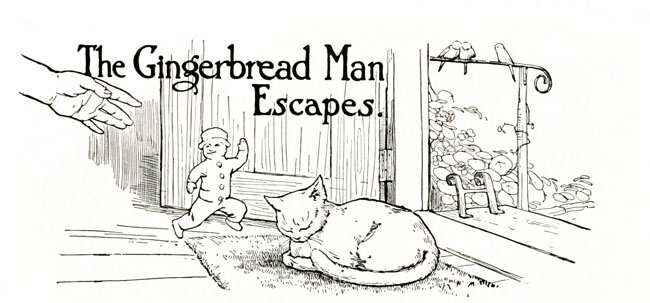

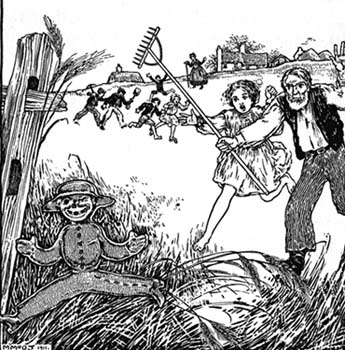


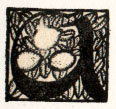 CERTAIN Sultan had a son of whom he was justly proud, for the young man was handsome and gay of temper, and had never been known to do an unworthy action. In the circle of the court he was the brightest star, and very sweet were the glances thrown him by the high-born ladies who served the Sultan. The Prince was courteous to them all, but he favoured no one, and as years went on, and he showed no signs of taking to himself a wife, the Sultan became disturbed.
CERTAIN Sultan had a son of whom he was justly proud, for the young man was handsome and gay of temper, and had never been known to do an unworthy action. In the circle of the court he was the brightest star, and very sweet were the glances thrown him by the high-born ladies who served the Sultan. The Prince was courteous to them all, but he favoured no one, and as years went on, and he showed no signs of taking to himself a wife, the Sultan became disturbed.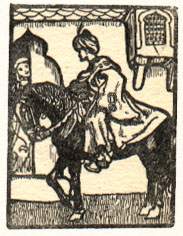 woman with scanty hair like wisps of snow, who stared at him inquiringly.
woman with scanty hair like wisps of snow, who stared at him inquiringly. 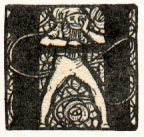 E noticed ere long that the grass by the roadside was very tall, and that the fields were heavy with corn ready for harvest. The air was so warm that it touched his cheek caressingly, and the sun shone down so hotly that he was fain to unloose his coat. He was very glad when at last he saw a small yellow house shaded by a group of trees. As he knocked at the door, he heard the sound of a distant waterfall, and the hope of quenching his thirst was more in his mind just then than the fairest wife in Summer's kingdom. His summons was answered by a stately woman crowned with auburn tresses.
E noticed ere long that the grass by the roadside was very tall, and that the fields were heavy with corn ready for harvest. The air was so warm that it touched his cheek caressingly, and the sun shone down so hotly that he was fain to unloose his coat. He was very glad when at last he saw a small yellow house shaded by a group of trees. As he knocked at the door, he heard the sound of a distant waterfall, and the hope of quenching his thirst was more in his mind just then than the fairest wife in Summer's kingdom. His summons was answered by a stately woman crowned with auburn tresses.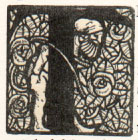 HE Prince would have thanked her for her kindness, but she waved him away with a smile and a sigh, telling him not to delay. Full of joyful anticipation, he rode once more through the kingdoms of Summer, Autumn, and Winter, and when he arrived at the coast found the same stately vessel awaiting his pleasure. The wind was favourable on his homeward voyage, and in a very short time he had once more gained the precincts of his father's palace. Giving his horse into the care of a groom, he hurried into the great gardens, and, when he had filled Spring's gold cup with water from the splashing fountains, cut open the first lemon. He had no sooner done so, than a most exquisite Princess appeared before him, and with a timid glance asked him to give her water.
HE Prince would have thanked her for her kindness, but she waved him away with a smile and a sigh, telling him not to delay. Full of joyful anticipation, he rode once more through the kingdoms of Summer, Autumn, and Winter, and when he arrived at the coast found the same stately vessel awaiting his pleasure. The wind was favourable on his homeward voyage, and in a very short time he had once more gained the precincts of his father's palace. Giving his horse into the care of a groom, he hurried into the great gardens, and, when he had filled Spring's gold cup with water from the splashing fountains, cut open the first lemon. He had no sooner done so, than a most exquisite Princess appeared before him, and with a timid glance asked him to give her water.
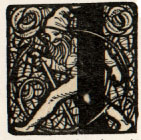 HAVE seen my face in the fountain," was the reply, "and I am much too lovely to fetch and carry like a poor slave."
HAVE seen my face in the fountain," was the reply, "and I am much too lovely to fetch and carry like a poor slave." 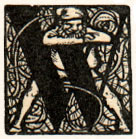 HERE is my sweet Princess?" he asked. "She is fair as the morning, and white as snow. What have you done with her?"
HERE is my sweet Princess?" he asked. "She is fair as the morning, and white as snow. What have you done with her?"
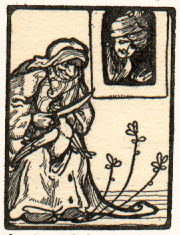 him how matters stood, he agreed that he must marry her, and hope for the best.
him how matters stood, he agreed that he must marry her, and hope for the best.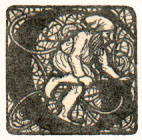 REAT was the joy and relief of the old Sultan when he heard from the Prince that this beautiful girl was his real bride, but he listened with a frown of anger as she told them all that had happened when her lover left her by the fountain. He ordered the serving girl to be immediately brought before him, and, regarding her very sternly, asked her what she would think a fitting punishment for an affront offered to the future wife of his dear son.
REAT was the joy and relief of the old Sultan when he heard from the Prince that this beautiful girl was his real bride, but he listened with a frown of anger as she told them all that had happened when her lover left her by the fountain. He ordered the serving girl to be immediately brought before him, and, regarding her very sternly, asked her what she would think a fitting punishment for an affront offered to the future wife of his dear son.